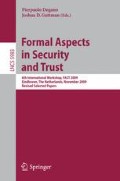Abstract
The Trusted Platform Module (TPM) is a hardware chip designed to enable computers to achieve greater security. Proof of possession of authorisation values known as authdata is required by user processes in order to use TPM keys. If a group of users are to be authorised to use a key, then the authdata for the key may be shared among them. We show that sharing authdata between users allows a TPM impersonation attack, which enables an attacker to completely usurp the secure storage of the TPM. The TPM has a notion of encrypted transport session, but it does not fully solve the problem we identify.
We propose a new authorisation protocol for the TPM, which we call Session Key Authorisation Protocol (SKAP). It generalises and replaces the existing authorisation protocols (OIAP and OSAP). It allows authdata to be shared without the possibility of the impersonation attack, and it solves some other problems associated with OIAP and OSAP. We analyse the old and the new protocols using ProVerif. Authentication and secrecy properties (which fail for the old protocols) are proved to hold of SKAP.
Access this chapter
Tax calculation will be finalised at checkout
Purchases are for personal use only
Preview
Unable to display preview. Download preview PDF.
References
ISO/IEC 11770-4: Information technology – Security techniques – Key management – Part 4: Mechanisms based on weak secrets
ISO/IEC 18033-2: Information technology – Security techniques – Encryption algorithms – Part 2: Asymmetric ciphers
ISO/IEC 18033-3: Information technology – Security techniques – Encryption algorithms – Part 3: Block ciphers
ISO/IEC 19772: Information technology – Security techniques – Authenticated encryption
ISO/IEC 9797-2: Information technology – Security techniques – Message authentication codes (MACs) – Part 2: Mechanisms using a dedicated hash-function
ISO/IEC, P.D.: 11889: Information technology – Security techniques – Trusted platform module
Ables, K.: An attack on key delegation in the trusted platform module (first semester mini-project in computer security). Master’s thesis, School of Computer Science, University of Birmingham (2009)
Blanchet, B.: An efficient cryptographic protocol verifier based on prolog rules. In: Schneider, S. (ed.) 14th IEEE Computer Security Foundations Workshop, Cape Breton, Nova Scotia, Canada, June 2001, pp. 82–96. IEEE Computer Society Press, Los Alamitos (2001)
Blanchet, B.: ProVerif: Automatic Cryptographic Protocol Verifier User Manual (2008)
Bruschi, D., Cavallaro, L., Lanzi, A., Monga, M.: Replay attack in TCG specification and solution. In: ACSAC 2005: Proceedings of the 21st Annual Computer Security Applications Conference, pp. 127–137. IEEE Computer Society, Los Alamitos (2005)
Chen, L., Ryan, M.D.: Offline dictionary attack on TCG TPM weak authorisation data, and solution. In: Grawrock, D., Reimer, H., Sadeghi, A., Vishik, C. (eds.) Future of Trust in Computing. Vieweg & Teubner (2008)
Gürgens, S., Rudolph, C., Scheuermann, D., Atts, M., Plaga, R.: Security evaluation of scenarios based on the TCG’s TPM specification. In: Biskup, J., López, J. (eds.) ESORICS 2007. LNCS, vol. 4734, pp. 438–453. Springer, Heidelberg (2007)
Lin, A.H.: Automated Analysis of Security APIs. Master’s thesis, MIT (2005), http://sdg.csail.mit.edu/pubs/theses/amerson-masters.pdf
Trusted Computing Group. TPM Specification version 1.2. Parts 1–3 (2007), http://www.trustedcomputinggroup.org/specs/TPM/
Author information
Authors and Affiliations
Editor information
Editors and Affiliations
Rights and permissions
Copyright information
© 2010 Springer-Verlag Berlin Heidelberg
About this paper
Cite this paper
Chen, L., Ryan, M. (2010). Attack, Solution and Verification for Shared Authorisation Data in TCG TPM. In: Degano, P., Guttman, J.D. (eds) Formal Aspects in Security and Trust. FAST 2009. Lecture Notes in Computer Science, vol 5983. Springer, Berlin, Heidelberg. https://doi.org/10.1007/978-3-642-12459-4_15
Download citation
DOI: https://doi.org/10.1007/978-3-642-12459-4_15
Publisher Name: Springer, Berlin, Heidelberg
Print ISBN: 978-3-642-12458-7
Online ISBN: 978-3-642-12459-4
eBook Packages: Computer ScienceComputer Science (R0)

